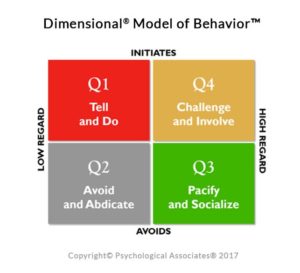
Coworkers Who Talk Too Much – How to Handle Someone who Rambles On
Coworkers Who Talk Too Much
How do you handle coworkers who talk too much and don’t get their work done? Studies show that excessive workplace chatter can be harmful–moreso than you might think. In light of this, should you reassign them to roles that don’t entail talking? Provide a financial incentive to hit their work goals, thereby incenting them not to talk as much? Have a coaching session with them? In this case study, we’ll explore 3 approaches and their pros and cons. You’ll learn the best approach for dealing with coworkers who talk too much, and be ready to deal with it when the challenge surfaces.
The Situation
You are a mid-level manager at an inventive company that develops apps and other tools in finance and accounting. Your department needs a live person who can field questions from customers after new product launches.
Ramon would be a good fit for this job, you decide, since he understands the products and communicates well with people.
Chatty Cathy
After a month on the job, you realize that Ramon is too good with people. His percentage of calls handled per hour is much lower than his predecessor. Friendly and talkative, Ramon simply spends too much time talking to each caller. And although you have mentioned this to Ramon, it doesn’t seem to make a difference.
Someone Who Talks A Lot
So you wonder, “How should I deal with Ramon?” How do you–in a Q4 manner–get coworkers who talk too much to chatter less and work more?
Your Choices:
Set Goals. Follow up with Frequent Feedback Sessions
You mentioned to Ramon that he needs to answer more calls per hour. His behavior hasn’t changed after being made aware of the issue. But don’t assume that “coaching” him hasn’t worked. What you’ve done in the past wasn’t coaching.Coaching is about getting people on board by involving them in changing their behavior. An initial coaching session would be an open discussion of Ramon’s strengths and barriers — “open” meaning, allowing Ramon to generate this list. Through self-discovery, Ramon should identify that he is overly talkative. You can then move on to generating specific goals for improvement (increasing the number of calls he should handle per hour).
What happens next is crucial: follow-through! As a manager, you should monitor Ramon’s performance closely (which is easily measurable in this case). Have checkpoint meetings, especially early on, to review how Ramon is doing. Provide feedback and discuss ways to stay on track or to re-focus if his performance starts sliding. The idea, of course, is not for Ramon to stop being warm and empathetic. It’s to help him eliminate rambling or getting off topic with customers.
Helping Ramon become a more effective employee is part of leadership. Often you can’t pick and choose who works for you. But you can help motivate people to be their most effective. Option A is the approach to take.
Provide a Financial Incentive to Increase Calls
Option B sounds good, doesn’t it? After all, organizations give bonuses and raises to reward exceptional performance. But using cash to motivate employees for performing day-to-day tasks that are part of the job description?In terms of setting normal job expectations, it doesn’t make sense. You could end up with a workforce who all expect on-the-spot payments simply for doing their jobs. Companies don’t have the kind of resources to sustain that practice. Plus, over time, Ramon may try to complete tasks too quickly, just to make more money. The quality of his work would suffer. Financially incenting is not a good approach for dealing with coworkers who talk too much.
Reassign the Talkative Employee to a Role that Involves Less Talking
Option C is entirely expedient, but you avoid being a leader. Q4 leadership asks you to bring out the best in people. Ramon is a natural for working with customers. His motivation will probably plummet if you remove the natural motivator for job satisfaction — interacting with people.Also, in the real world, you don’t get to pick ideal members for each part of your team. Working with what you’ve got is often the reality. Yes, you try to find the best, but instead, you may have to help people become their best. People can learn and change. This is an opportunity to call on Ramon’s strengths (product knowledge and people skills), but also to help him see how to modify his behavior. He can gain insight for using his strengths more effectively. Coaching is the answer; see Answer A.
No, please try again.
No, please try again.
Let’s Talk About Next Steps
You now know best practices for handling coworkers who talk too much. Well done! If you are ready for more leadership learning, our Learning for Leadership web page is chock full of resources. Additional leadership tips, white papers, … There is even a Do You Work with a Difficult Person service that will give you advice on handling your situation effectively.
If you are ready to move from learning about leadership to becoming a Q4 leader, check out our leadership development page. Our interpersonal leadership skill workshops, individualized coaching, 360 feedback, etc. are all available tools to assist in your leadership development.
Remember to sign up for our newsletter. It has new leadership information and upcoming events.










